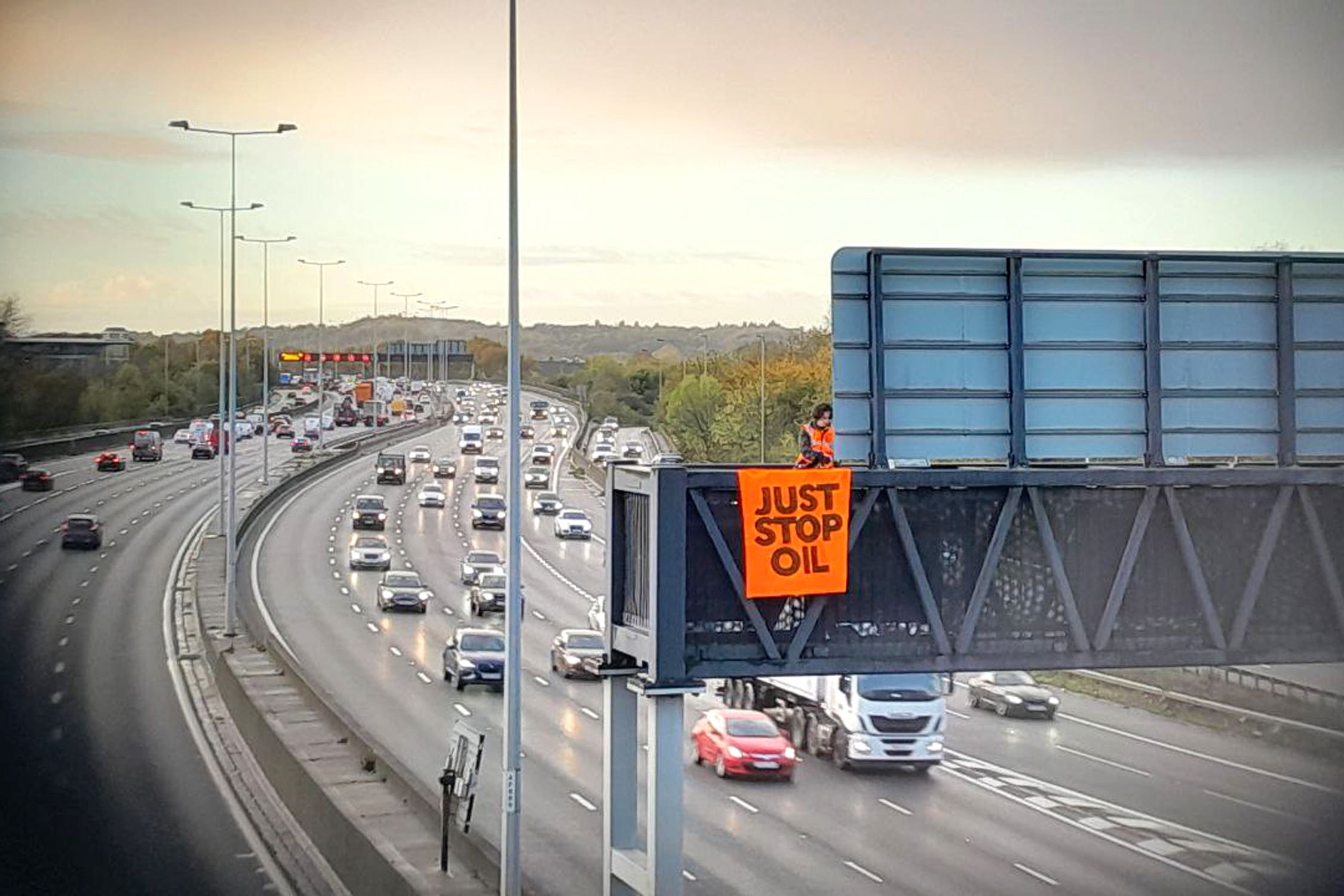Police chief questions M25 protests coverage after journalist arrests
David Lloyd told journalists they should think about whether or not to give the protests by Just Stop Oil the “oxygen of publicity”.

Your support helps us to tell the story
From reproductive rights to climate change to Big Tech, The Independent is on the ground when the story is developing. Whether it's investigating the financials of Elon Musk's pro-Trump PAC or producing our latest documentary, 'The A Word', which shines a light on the American women fighting for reproductive rights, we know how important it is to parse out the facts from the messaging.
At such a critical moment in US history, we need reporters on the ground. Your donation allows us to keep sending journalists to speak to both sides of the story.
The Independent is trusted by Americans across the entire political spectrum. And unlike many other quality news outlets, we choose not to lock Americans out of our reporting and analysis with paywalls. We believe quality journalism should be available to everyone, paid for by those who can afford it.
Your support makes all the difference.The Hertfordshire Police and Crime Commissioner appeared to blame journalists for not covering Just Stop Oil protests “appropriately” after the force was heavily criticised for arresting members of the press.
David Lloyd admitted officers may have “got it wrong” after LBC’s Charlotte Lynch was detained as she tried to report on the demonstrations causing widespread disruption on the M25.
But he insisted journalists should be “thinking about” whether it was right to give the protests the “oxygen of publicity”.
I think we've just got to ask ourselves as a society if we are handling the Just Stop Oil appropriately by giving them the oxygen of publicity
The force prompted outrage after Ms Lynch described being handcuffed and left in a cell on suspicion of conspiracy to commit public nuisance despite having shown officers media accreditation.
Documentary maker Rich Felgate and photographer Tom Bowles were also arrested a day earlier for trying to capture footage of the activists in Hertfordshire.
The pair had their equipment seized and were taken to a police station, despite efforts to show their press cards and explain they were there in a journalistic capacity.
“I think we’ve just got to ask ourselves as a society if we are handling the Just Stop Oil appropriately by giving them the oxygen of publicity,” PCC Lloyd told LBC’s Nick Ferrari on Thursday.
Mr Ferrari replied: “I put it to you that you are far better versed in police affairs than I am, but perhaps in the news business I might just have the edge. This is news – if you close vast tracks of a 116-mile orbital road because of one particular protest… that’s what we in the business call news.”
But the commissioner doubled down on his criticism of the way events along the motorway had been covered in the media.
He drew a comparison with how he imagined the press would report on a person trying to take their own life on a ring road, which he did not think would be covered “in the same way”.
“The question I’m pushing back to you is that fine line between reporting the news and making the news and whether or not that is crossed on occasion by reporting it in such a sensational way,” he said.
“I recognise it’s news, I recognise it’s interesting. But it would similarly be news if a vast portion of an orbital motorway were closed because someone was trying to commit suicide.
“We wouldn’t be – you wouldn’t be reporting that in the same way, and I just think you need to think about it. I’m not saying anyone should have any control over it, I’m very much up for a free press, but I just think that voluntarily you should be thinking about how do we report that.”
It comes after Prime Minister Rishi Sunak joined police chiefs in calling for press freedom after the arrests earlier this week.
Mr Sunak said it is “vital” that journalists are able to do their job freely, “without restriction”, as the chief constable of Hertfordshire Police called for a review into the arrests.
The Prime Minister’s official spokesman told reporters: “I am cautious about commenting on specific incidents. Operational decisions are a matter for the police but the Prime Minister strongly believes in championing press freedoms.
“We wouldn’t want to see those freedoms impeded while journalists are going about their day-to-day business.”
Metropolitan Police Commissioner Sir Mark Rowley said: “Press freedom is really important and you will often want to be – and quite rightly be – quite close to where difficult things are happening so you can report it well and I absolutely, absolutely support that.
“The principle that you’re going to be close to the action sometimes, and we should be sensitive to press freedom, of course, I completely agree with.”
Home Secretary Suella Braverman later said the reports she had heard were “concerning”, but added that any investigation into what happened should be allowed “to run its course” without pre-judgment.
It came after Liberal Democrat MP Daisy Cooper asked the Commons deputy speaker Nigel Evans how the House could summon Ms Braverman to explain and apologise for the treatment of journalists covering protests given the “severity of the incidents”.
Hertfordshire Police, in a statement released on Wednesday evening, acknowledged that while the actions of its officers at the scene were “understandable”, Ms Lynch’s arrest “would not have been necessary”.
It added that extra measures are now in place to ensure that legitimate media can do their job, with officers instructed to ensure they conduct “full and thorough checks”.
The force said: “In addition, Mr (Chief Constable Charlie) Hall is requesting an independent force to examine our approach to these arrests and to identify any learning we should take in managing these challenging situations.”